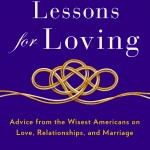In our society, we have a paradox. Most people want to get married and there is considerable research evidence that marriage has a wide range of benefits. But too often, the joy that accompanies the wedding celebration turns sour, and nearly half of couples who stand at the altar in hopeful excitement find themselves starting over after the trauma of divorce.
wide range of benefits. But too often, the joy that accompanies the wedding celebration turns sour, and nearly half of couples who stand at the altar in hopeful excitement find themselves starting over after the trauma of divorce.
I was particularly interested in long-married elders’ advice about finding a life partner and staying married. In my new book, 30 Lessons for Loving (coming out this January), I surveyed 700 older Americans for their advice.
Here are three major (and somewhat surprising) lessons from the elders for finding a life partner and staying together “as long as you both shall live.”
Marry Someone a Lot Like You
I asked hundreds of elders what is most important for a long and happy marriage and their advice was just about unanimous: Opposites may attract, but they don’t make for great and lasting marriages. Based on their long experiences both in and out of love relationships, their first lesson is this: You are much more likely to have a satisfying marriage for a lifetime when you and your mate are fundamentally similar. And the most important thing to look for is similarity in your core values.
Take Emma Sylvester, who at 87 has been married for 58 years. As she put it with a smile, “It’s quite an achievement.”
I didn’t know it when I got married, but in retrospect I know it’s important to have the same basic values. In other words, if you’re a free spender, marry somebody who understands that. If you’re frugal, you need to marry somebody who understands that, because money is one of the stumbling blocks in marriages. And fortunately we had the same values on most things. Because of this, we really didn’t argue. And we really didn’t agonize over things. We came to our decisions by just realizing that we had usually the same goals. We both believed in education. We wanted to be moral according to society’s standards, to raise our children to be good citizens, and to be responsible in terms of finances.
Arguments emerge over apparently trivial issues, the elders told us, because they really reflect underlying values. Whether the wife purchases an expensive golf club or the husband a new electronic toy is not the core issue in what can become a monumental fight, but rather the deeper attitude toward what money means and whether the financial interests of the couple are more important than indulging an individual whim.
The elders urge people committing to a relationship to ask the question: Do we believe the same things in life are important? If problems develop in the relationship, these experts on long marriages say that value differences are likely to be at the heart of the problem.
Never Expect Your Partner to Change after Marriage
What about taking a leap of faith on the marriage under the assumption that you can change your partner after you’re married? The elders were as clear about this possibility as can be: Forget about it. According to them, entering into a marriage with the goal of changing one’s partner is a fool’s errand.
Rosie Eberle, 80 and happily married for 56 years, had a blunt comment to make about the entering into a marriage expecting to change one’s partner: “It’s just plain stupid.” She went on:
For heaven’s sake, don’t say “Oh, he’s this way now but he won’t always be like that.” Because they usually are, and you have to be careful, that’s all. So don’t marry someone and then think, “Oh, well he’ll change.” Or “I’m going to change him.” Believe me, it doesn’t happen. But people get real stubborn, and believe that can change a person later on, which never works.
Friendship Is as Important as Love
When asked the question: “What’s the secret to a long, happy marriage such as yours?” a common answer from people in long marriages was: “I married my best friend.” Similarly, from those whose marriages did not succeed, I often heard: “Well, we were good at love, but we never learned how to be friends.”
This response sounds peculiar, given that we are schooled in our culture to differentiate between friendship and romantic love. Indeed, television shows like “Will and Grace” and “Sex and the City” popularize the view that cross-sex friendship works best (or only) when one of the friends is gay. We see friends and spouse as two separate social categories that have different functions.
In contrast, the elders say that the special qualities of friendship are exactly what you want in your marriage. We typically look forward to being with friends, we relish their company, we relax with them, we share common interests and we talk openly. In contrast, we all encounter people who do not feel they can talk easily to their spouse (next time you are out for a fancy dinner, observe the couples who manage only a few uncomfortable words over two hours). What the elders suggest is that you look for the qualities of a friend — the capacity to comfortably “hang out” — in the person you choose to marry. As one 87-year old told me: “Think back to the playground when you were a child. Your spouse should be that other kid you would most like to play with!”
According to the elders, all marriages have to undergo a transition from the initial thrill of romantic attraction and — many were honest about it — overwhelming sexual desire to the stages when other things must become as or more significant. After being swept off one’s feet by true love, the elders caution you to ask “What’s next?” Will you wake up next to the same person for five or six decades and still find a person you like as well as love?
Patty Banas, 80, made a go of a first marriage when young, divorced, and then “got it right” in her very happy second marriage. She had one recommendation:
Be sure that you’re really good friends. That is the most important thing. All this — all the romance and the bells and the whistles and stuff is all very nice but it doesn’t last. Be sure that you’re really, very good friends.
As a relationship is moving into a serious phase, a question couples can and should discuss is: If we weren’t in love, would be friends? And when we move to something other than heart-thumping passion, what is there that will keep us together? (Hint: The answer should not be kids.) The answer is friendship, and if you don’t have it, don’t get married — it’s that simple.
Marriage will probably never go out of style in our culture. Why? There’s no more evocative summation than that from Ellie Banks, the mother of the most famous June bride of all in the 1950s film classic Father of the Bride:
“Oh, Stanley. I don’t know how to explain. A wedding. A church wedding. Well it’s, it’s what every girl dreams of. A bridal dress, the orange blossoms, the music. It’s something lovely to remember all the rest of her life.”
But after the bouquet is thrown and the last grain of rice is swept up, the realistic approach of those who have experienced decades of marriage can help us make our unions last.
 pass down to younger people. In the interviews, I often feel a deep connection to respondents, especially over the course of a long conversation about profound and personal topics.
pass down to younger people. In the interviews, I often feel a deep connection to respondents, especially over the course of a long conversation about profound and personal topics.







